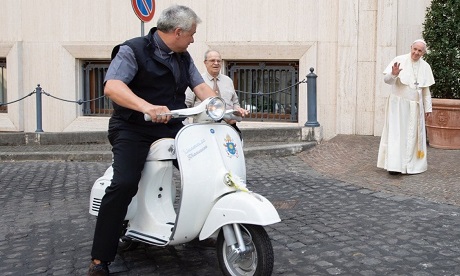The Pope’s charity is helping transgender sex workers left without income due to the coronavirus (COVID-19) lockdown.
It all started two weeks ago, when a trans woman asked Fr Andrea Conocchia for help.
He gave her food and basic supplies from the care packages.
The day after, the woman returned with a friend – then more and more people arrived.
As Conocchia’s parish’s resources were already stretched by the COVID-19 pandemic and two of the women are from Argentina, he urged them to write to Pope Francis about their situation and to ask for the money they needed to pay their rent.
Francis showed his support through the papal almoner Cardinal Konrad Krajewski (pictured on the bike), who administers the pope’s charitable work.
Throughout the COVID-19 outbreak, Krajewski has been driving around Rome distributing food and medical supplies to the poor.
He has also given them enough money to cover their rent and bills until the nationwide lockdown ends.
Krajewski responded to the women’s plea for help by transferring money to the parish.
“What a great answer by the Holy Father!” Conocchia says.
“It gave us the chance to give concrete help for their needs.”
He says he reached out to Francis knowing his concern for “the most in need, the smallest, the most fragile, who live in the margins, or as the pope says, the most discarded.”
Krajewski says he is surprised at the media attention the Church’s support for the trans women is getting.
“This is ordinary work for the Church, it’s normal. This is how the Church is a field hospital.”
“We follow the gospel.”
He also pointed out that trans sex workers are probably undocumented, as the Mafia often confiscates their passports. This makes it difficult for them to seek help from Italian state welfare offices.
“Everything is closed. They don’t have any resources. They went to the pastor. They could not have gone to a politician or a parliamentarian. And the pastor came to us.”
Conocchia is defending his decision to ask the pope for help for the women.
“As a person, I am happy to meet them personally and listen to them personally, as I hope that any priest would do.”
He says he’s happy the Church was a point of reference for them, even though their lives are currently not in step with the Church’s teachings.
“They know very well about their lives, they know very well,” he notes.
He says when two of the individuals were drafting the letter that was sent to Krajewski, they were “crying like children,” because they were ashamed, but they also encouraged one another to be honest.
“What was important to me was the open door of the parish church, and the possibility of welcoming, listening and accepting the person that I had truly and concretely in front of me,” Conocchia says.
Source
Additional readingNews category: World.




